African Pouched Rat behaviour
In very many ways Pouched Rats' behaviour is different from domestic rats' becuase Pouched Rats are not a domesticated species. Domestication will take very many generations to achieve so owners must always remember that the current captive population retain all their wild instincts. Even the most solialised individuals can exhibit their wild traits from time to time. Pouched Rat owners should expect the unexpected.
Temperament
Temperament varies greatly between individuals and, as yet, there are not any firm generalisations that can be made between the sexes.
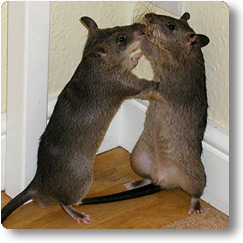
Arguably the most significant factor affecting temperament is the relative dominance of the individual. Dominance plays a vital role in the wild. Pouched Rats live in loose matriarchal colonies where breeding only occurs in female dominant pairs. Exactly how this social system operates in captive individuals is not clear but it appears to be at the cause of some unpredictable behaviour.
- My male rat, Jaali, was extremely sweet natured up until the age of two. He then, quite quickly, became aggressive towards me and it took several months of firm handling to make him sociable again.
- Another owner's male rat, while remained very gentle with them, would attack anyone else.
- A male, who was generally aggressive to people, was very happy to have another male as his cage mate. Previous to this the general view was that males could not be kept together.
There are also plenty of examples of well socialised individuals who form life-long affectionate bonds with their owners but the examples of the unpredictable behaviour illustrate what anyone wanting to keep Pouched Rats must be prepared for.
The one, almost universal, trait exhibited by most individuals is extreme wilfulness and determination. Pouched Rats have good memories and are not easily distracted from a task that they have set their minds on. At a very early age Ambaa took great pleasure in sitting under a sideboard and gnawing away at the bottom drawer. Access to the underside of the sideboard was quickly blocked off but she would try anything to get back under. She’d try to dig away at the carpet but her favoured plan was to gnaw away one of the legs. Whenever she was out, right up until the day she died, the sideboard had to be guarded. She never forgot.
Senses
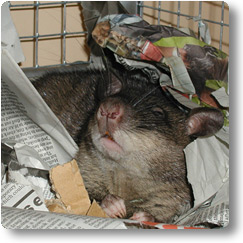
Pouched rats seem to be virtually blind. They find their way about by smell and they find out what’s happening around them by hearing. This is no doubt why they have such big ears and noses. Sight doesn’t seem to be an important sense to them. They don’t seem to notice when a light goes on and they are not bothered by camera flashes. They are very good at detecting movement but, as most movement is accompanied by some sound, it’s hard to know which sense they are using.
Pouched rats’ ears are more mobile than the ears of domestic rats and are hardly ever still. They swivel about like radar dishes as they track what’s going on around them. They follow sounds even when the rat appears to be asleep. When deeply asleep their ears twitch very rapidly in a way which reminds me of ‘rapid eye movement’ in sleeping people. There is very little fur just behind their ears and as the ears move and flick about these bare patches appear like white flashes.
Pouched Rats sniff and smell their way about, especially if in a new environment. When woken up the first thing that appears is the nose, usually pointing straight upwards and sniffing the air to ‘see’ what’s about. The more nervous or unsure they are the louder the sniffing is.
Nocturnal
Pouched Rats spend most of the day asleep and can be very difficult to wake up during the day. If disturbed they make a lot of grumbling noises and can be so reluctant to wake up that when they initially emerge from there nests they are still half asleep.
However Pouched Rats quickly adjust themselves to a regular route en – especially where food is involved. My rats are usually awake, or will wake up readily, for breakfast at 7:30 and start to become active from about 9:30 pm in readiness for play time. The later it gets the more active active they are. There most active time at around 3:00 am and they often makes so much noise then that they wake the whole house.
Grooming
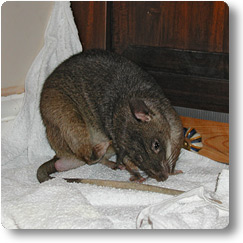
Much of their waking time is spent either eating or grooming. A full tip of nose to tip of tail wash can take 15-20 minutes. They groom themselves in much the same way as domestic rats, licking, scratching and combing their fur, but there are differences.
Because of their larger ears they are able to grab hold of the tip of an ear and pull it down to their mouth so it can be given a good licking.
They also have pouches to clean and will put a paw into their mouths to clean the insides. They also grab hold of their pouches and pull them down like jowls when they are cleaning the rest of their face.
They are very fastidious about cleaning their tail. They start at the base and lick it all round down the whole length to the tip. They put the tip right inside their mouths and scrape it with their teeth.
Moving about
Pouched Rats love to run. They seem to do it just for the sheer fun of it. When they are in an area they know they’ll race round it at full speed, dashing from one corner to the other. A single rat sounds like a whole herd when pounding along at full speed. They will often start the run with a little jump, bouncing once about six inches into the air, landing then setting off at full speed.
While they can jump they prefer the security of climbing onto things rather than jumping onto them. Even in areas they know well they are reluctant to jump.
They also like to pounce on things. If they hear something close to them, such as some food being dropped into the cage, they jump onto it pinning it down with their front feet.
Playing
Pouched Rat play is similar to the way kittens play but they get bored very quickly so the games don’t last as long. The games are usually quite energetic and involve fighting and biting things.
Favourite games include:
- Having a towel thrown over them which they wriggle out from under and then they fight the corner of the towel
- Fighting the end of a length of rope, with a bell or ball on. This can be hung from a door handle or dragged along the ground in front of the rat.
- Pouncing on and biting a black furry ball as its rolled along the floor.
They also seen to enjoy running. They’ll race at full speed round the edge of a room, stop, turn round then race back again.
Pouches/eating
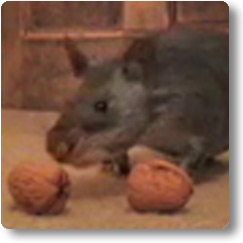
![]() Go
to the movie page
Go
to the movie page
Pouched rats use their cheek pouched for carrying food and, occasionally, other items. This allows them to collect much more food on one foraging trip than a domestic rat. Domestic rats will trot back to their houses to store any food they find whereas Pouched rats simple tuck it into their pouches and carry on foraging. Pouched rats can carry huge quantities of food in their pouches. They appear to be very elastic and, when full, they completely change the shape of the rat’s face. This video shows Ambaa ‘pouching’ two whole walnuts, and still had room for a couple of monkey nuts.
Pouched Rats usually keep a few small food items in the pouches at all times - so they are never without a snack.
Potty training
My first rat, Kali, told me that she wanted a potty by constantly pooing in her water bowl!
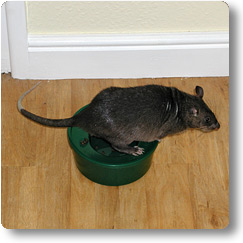
I got her a medium sized 'non-splash' pet bowl (imaging a bowl with a lid which has a hole in the middle) half filled it with water and she used it straightaway. I really didn't have to train her. I had to find a way of securing it in her house because she kept up-ending it and there was one occasion where she gnawed a hole in the bottom of the potty but generally its been a huge success. All my Pouched Rats have used pottys and it makes keeping their houses clean very easy.
They also use the potty when out playing. I make sure its always in the same place so they know where to find it and they uses it every time.
They are not nearly so good with where they wee. They sometimes use the potty for this. This could be because they like to regularly taste their wee. This sounds disgusting but many animals do this to monitor their own health.
Vocalisation
Pouched Rats, especially pairs, talk a lot. Once they have settled into their surrounding and have become confident they can become very vocal. They make quite a range of squeaks, chirrups and clicks and are able to communicate their feelings quite well.
Solitary Pouched Rats are most vocal when disturbed. They make a low level grumbling sound when there’s some background noise, such as the TV, which is disturbing them. When suddenly woken up by a loud noise or because the cage has been opened they make a scolding noise which can go on for several minutes. My rats also make this noise if their breakfast is late.
They shows intense displeasure by making a rapid clicking/tutting sound. They also make delighted squeaking noises. These usually happen when I drop treats into the cage and they forages about for them. Every time one is found they let out a squeak of pleasure and triumph.
A pair of Pouched Rats are vocal much more of the time and add shrill shouts to the repertoire of noises. Mating is a particularly noisy affaire.
